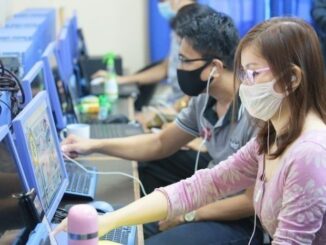
MANILA, Philippines — Climate change, education and job opportunities are the leading concerns for almost 3,000 young people in the Philippines, according to the results of an online poll by the United Nations.
A higher percentage of female respondents identified climate change and health as their generation’s top concerns, the results of the U-Report poll showed. Meanwhile, male respondents were more likely to say that future generations will be worse off than today.
U-Report is UNICEF’s polling tool where participants — mainly young people — can receive and respond to polls through SMS and online messaging platforms. It was first introduced in the Philippines during the COVID-19 pandemic.
U-Report’s latest poll, released on September 16, included 3,109 responses to four questions that aimed to gauge young people’s views on the future.
UNICEF Representative to the Philippines Oyunsaikhan Dendevnorov said in a news release that the findings are a “sobering, yet hopeful outlook” that young Filipinos have for the future.
1 in 4 young Filipinos worry about climate change
About a quarter (26%) of young Filipinos consider “climate change and natural disasters” as the most pressing issue in the future. Nearly 60% of young women who answered the poll see climate change as the biggest issue for their generation compared to 40% of young men.
Overall, at least 22 to 23% believe finding a job, health (including mental health) and completing their education are major concerns. Young men were more likely to say that finding a job is their generation’s top concern (40%) compared to young women (14%). Meanwhile, only young women (14%) identified health as a pressing issue.
Only 2% said gender equality was a top concern for young people, while 4% had answers not part of the options. No respondent chose violence as a top concern.
Respondents of different age groups prioritize different issues, with those youngest (below 14 years old) and at least 31 to 34 years old sharing the same top concern for the future: their health, including mental health.
For instance, the most number of Filipinos who identified health, including mental health, as their biggest problem in the future were aged 31-34 years old (50%), followed by those younger than 14 years old (28%).
Meanwhile, most responses that chose climate change as the biggest future concern came from the 25-30-year-old group (35%).
More young women hopeful about the future
Most respondents believe future generations will not see improved conditions. At least 44% said the future generations will be “worse off than today” compared to 37% who said they will be better off. At least 19% said future generations will be “the same as today.”
Young men and women are also split on whether future generations will inherit a better world than today. At least 75% of young men believe that the future will be worse off compared to 29% of women. Meanwhile, at least 43% of young women project a better future than 25% of young men. Only female respondents (29%) said future generations will have similar conditions as the present.
Young Filipinos also identified the lack of entry-level jobs (33%) and the current economic conditions (26%) as their two biggest obstacles in getting a job or starting a business in the future. Other concerns are the lack of access to quality education (20%) and the disruption AI technology has brought and can bring (18%).
The Philippine-wide U-Report poll results was released ahead of the “Summit of the Future 2024” happening at the UN Headquarters in New York from September 22 until September 23.





Be the first to comment